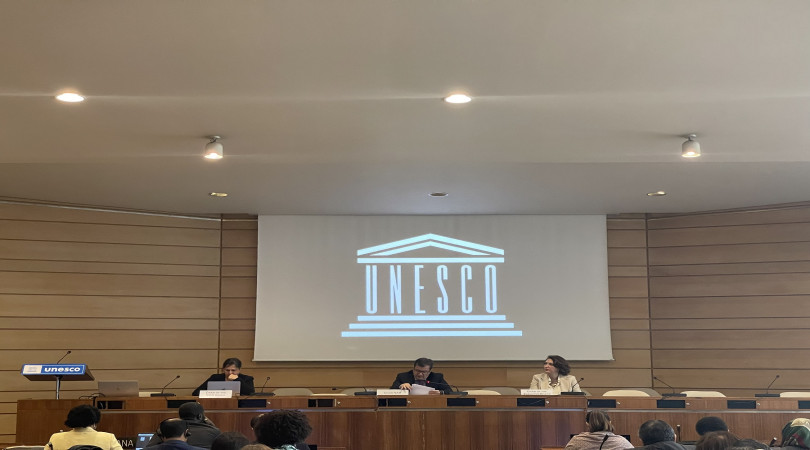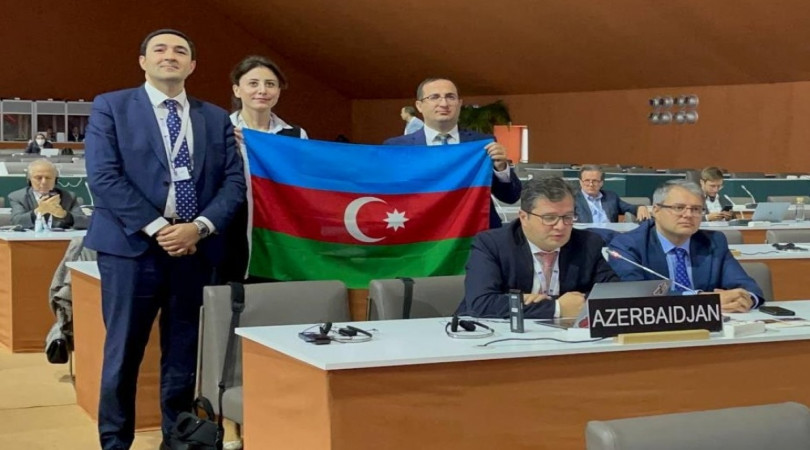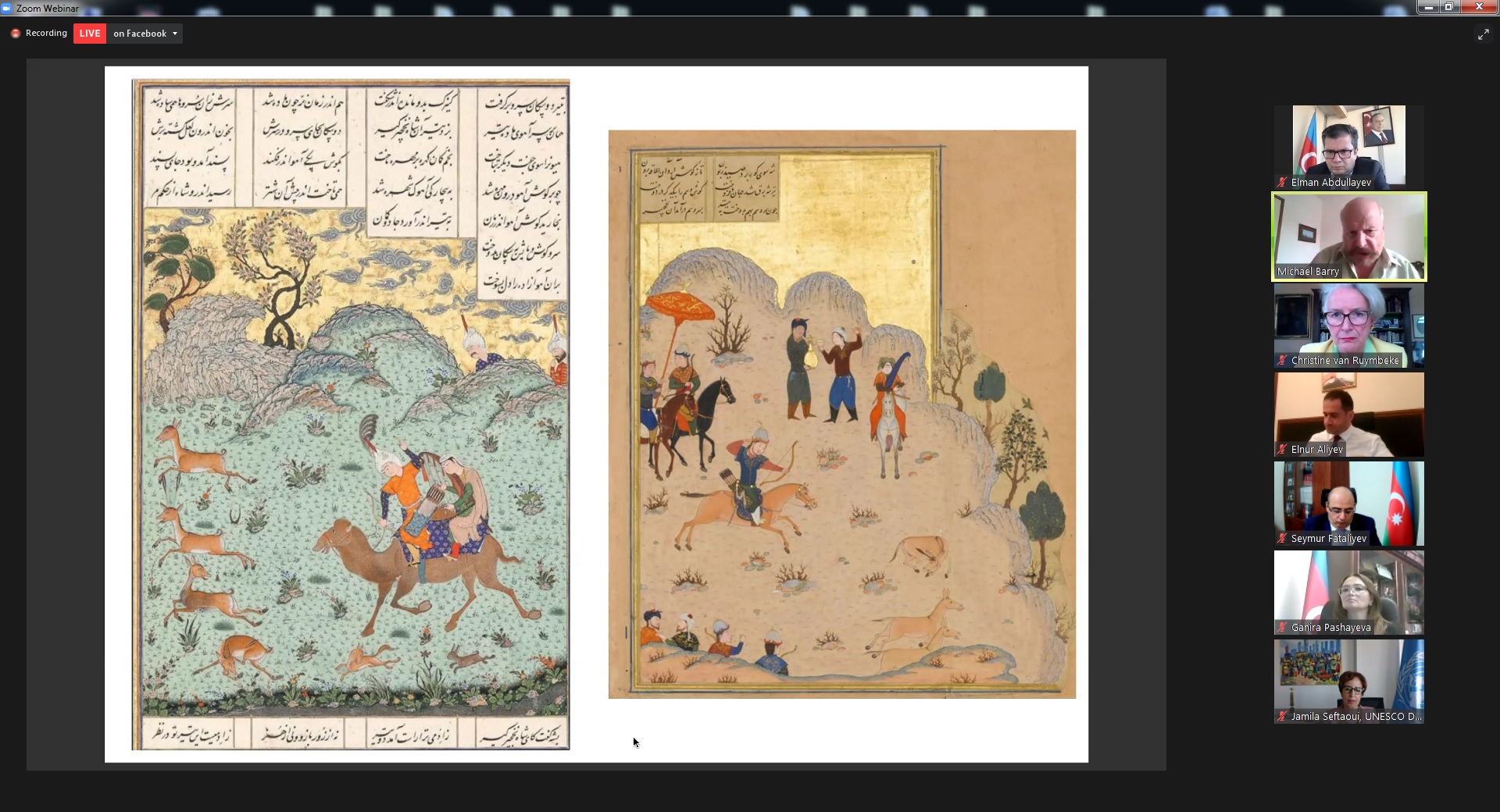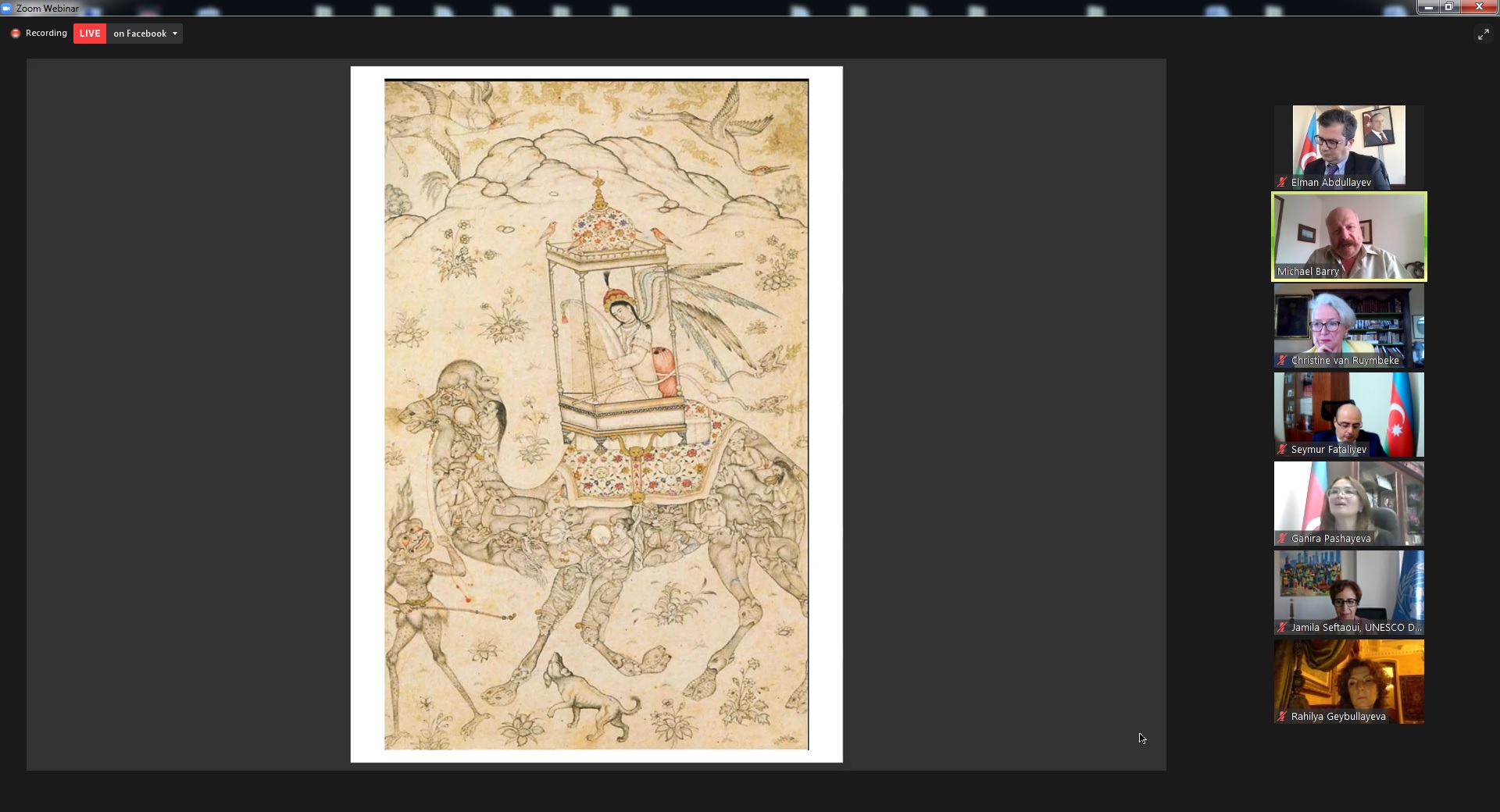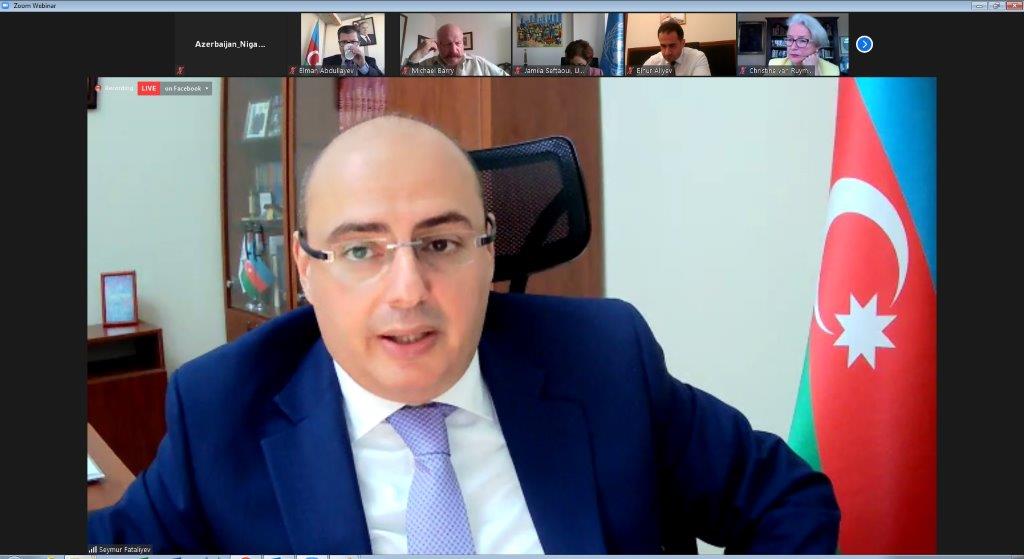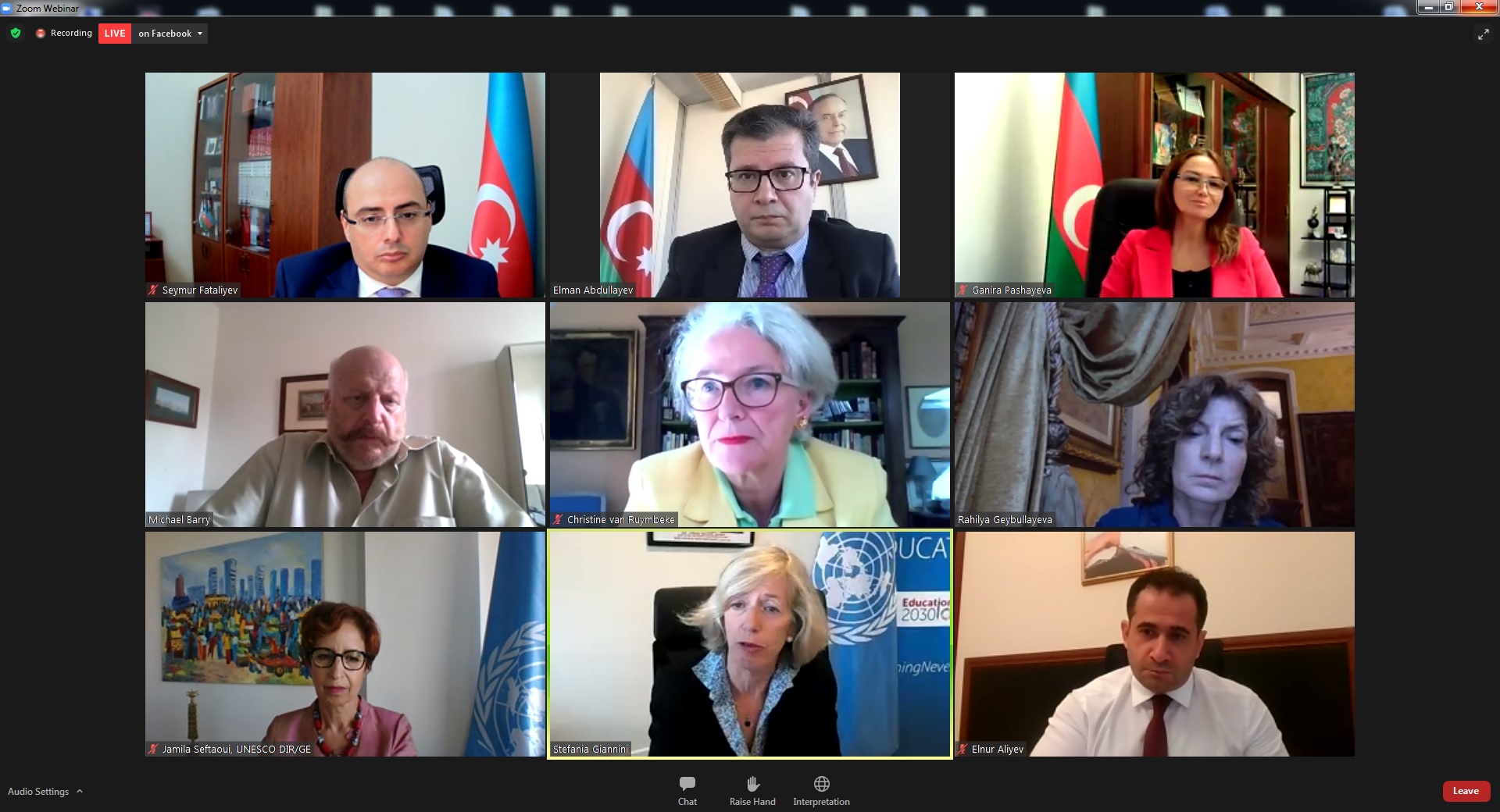UNESCO: Webinar entitled "Equal Education & Gender Equality through the prism of philosophy of Nizami" was held
The National Commission of the Republic of Azerbaijan for UNESCO, Permanent Delegation to UNESCO, Nizami Ganjavi International Center and UNESCO organized a joint webinar entitled "Equal Education & Gender Equality through the prism of philosophy of Nizami" within the "Year of Nizami Ganjavi".
The conference was moderated by the Permanent Delegate of Azerbaijan to UNESCO, Ambassador Elman Abdullayev. First Deputy Minister of Culture, CEO of the Nizami Ganjavi International Center Elnur Aliyev, Assistant Director-General for Education of UNESCO Stefania Giannini, Director of the Division for Gender Equality in the Office of the Director-General of UNESCO Jamila Seftaoui, Secretary-General of the National Commission of the Republic of Azerbaijan for UNESCO, Ambassador-at-Large Seymur Fataliyev and Member of the Parliament of the Republic of Azerbaijan, Chair of the Cultural Committee of the Parliament Ganira Pashayeva spoke during the webinar.
Azerbaijani and international researchers studying the legacy of Nizami Ganjavi as Professor Christine van Ruymbeke from the Faculty of Asian and Middle Eastern Studies of the University of Cambridge, Michael Barry, Professor of the Princeton University and historian of the greater Middle East and Islamic world, American University of Afghanistan and Professor Rahila Geybullayeva, founder and president of the Azerbaijani Association of Comparative Literature, the head of the Azerbaijani Literature Department of the Baku Slavic University gave the comprehesive presentation about their scientific research on Nizami’s literary heritage.
Speaking at the opening of the webinar, Ambassador Elman Abdullayev stated about Nizami Ganjavi's legacy, saying that the great Turkic poet Alisher Navai, while praising Nizami as a master in all his poems, repeatedly mentioned him as a sun of Ganja, the city where he was born, lived, died and buried.
He noted that the Nizami’s ideas of XII century resonated with the global problems of our world today. Emphasizing that the masterpieces of the great Nizami always called for rich high moral qualities, Ambassador Abdullayev said that the main purpose of being today together is to advance the discussion from the perspective on the meaning, scope and opportunities of Nizami’s literary heritage, to share his philosophy with the international community and identify areas for international collaboration and networking to advance SDG 4 – quality education & SDG 5 – gender equality globally by using the valuable ideas of Nizami.
Assistant Director-General for Education of UNESCO Stefania Giannini noted that Nizami Ganjavi highly valued science and education, noting that education is at the heart of UNESCO's mission to build peace, eradicate poverty and ensure sustainable development. Underlining that Nizami's ideas on education are still important today, she spoke about the Global Education Coalition, established at the initiative of the Organization in response to the COVID-19 pandemic as well as the Organization's activities in various countries in the field of education.
First Deputy Minister of Culture, CEO of the Nizami Ganjavi International Center Elnur Aliyev said that the immortal literary heritage of our genius thinker, whose 880th anniversary is celebrated this year, has become not only an integral part of our people's spirituality, but also humanism, love, high morals, aesthetic pleasure and deep philosophical thoughts of his works is addressed to humanity as a whole. His famous "Khamsa" stood at the peak of the exploration of spiritual riches of mankind and took a worthy place among the masterpieces of the world literature.
Jamila Seftaoui, Director of the Division for Gender Equality in the Office of the Director-General of UNESCO, stressed that the Organization considers gender equality a fundamental human right, as well as a prerequisite for sustainable development. Ms. Seftaoui spoke about the upcoming strategic initiatives and key programs of UNESCO on gender equality. Noting that she was impressed when she read that women are the voice of peace and wisdom in Nizami's works, Ms. Seftaoui told about passages from the poem "Leyli and Majnun" dedicated to the role of women. Citing examples of women who played a conciliatory role in Nizami's masterpieces, she pointed up that women still make great contributions to peace and reconciliation.
In her speech, Ganira Pashayeva, chair of the Culture Committee of the Milli Majlis, shared her views on the poet's works. She stated about the benevolent attitude towards women in Nizami's works, calling people to moral perfection and humanism, instilling high moral qualities, calling for respect for science and education, rights and the rule of law, the principle of social justice. In the video conference, Pashayeva spoke about the grave consequences of Armenia's occupation policy, the Khojaly genocide, vandalism committed in our occupied lands for 30 years, the destruction of our cultural and art monuments, the looting of museums. She also touched upon the insult of our mosques and graves, the destruction of our cities and villages. MP said that the mentality of all this contradicts the current stage of development of human civilization.
Secretary-General of the National Commission of the Republic of Azerbaijan for UNESCO, Ambassador-at-Large Seymur Fataliyev said that Nizami Ganjavi's philosophical thoughts are influenced the evolution of philosophical thought and the development of literary tradition around the world. Under the leadership of the First Vice-President of the Republic of Azerbaijan, UNESCO Goodwill Ambassador Mrs. Mehriban Aliyeva, major projects have been implemented to promote our national culture and literature in the world. The reprint of Nizami Ganjavi's "Khamsa" is also among these projects. He noted that Nizami Ganjavi's immortal works gave impetus to the development of "Miniature Art", which was jointly proposed by Azerbaijan, Turkey, Uzbekistan and Iran and included in the UNESCO Representative List of the Intangible Cultural Heritage of Humanity in 2020. S. Fataliyev said that since the universal values put forward by UNESCO coincide with the general spirit of Nizami's works, this Organization is the most suitable platform to promote Nizami Ganjavi's ideas and cultural heritage. The ideas and thoughts in the works of the great poet call the world to wisdom, peace and reconciliation.
Afterwards the researchers spoke about Nizami Ganjavi's creativity and works. It was noted that Nizami Ganjavi was a promoter of gender equality, women's education and wisdom. The philosopher's thoughts, the struggle against ignorance, respect for human dignity, women's rights, gender equality, the spiritual perfection of faith, the call for peace and justice, and humanism were discussed. The elements that ensure the immortality of Nizami's art, research on the images of women that form the basis of his creative criteria, were presented.

